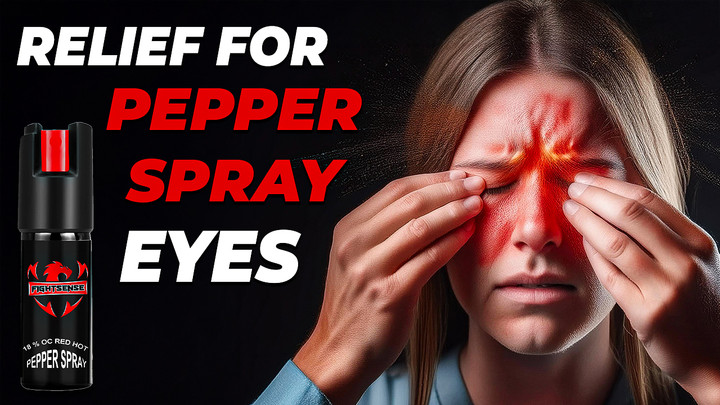Relief for Pepper Sprayed Eyes: Effective Remedies
21st Dec 2024
Pepper spray is a commonly used self-defense tool known for its ability to incapacitate attackers. However, accidental exposure can be extremely painful and disorienting, especially in the eyes. If you’ve been pepper sprayed, acting quickly and correctly can significantly reduce discomfort and prevent complications.
Keynotes
- Flush pepper-sprayed eyes with lukewarm water or saline for 15-20 minutes.
- Avoid touching or rubbing the affected area.
- Move to fresh air immediately to reduce exposure.
- Discard contact lenses after exposure.
- Seek medical advice if symptoms persist or worsen.
How Does Pepper Spray Affect Eyes?
The active ingredient in pepper spray, capsaicin, is derived from chili peppers. Upon contact with the eyes, it triggers:
- Intense burning: Capsaicin stimulates nerve endings, causing a fiery sensation.
- Redness and swelling: The irritant leads to inflammation of the eye area.
- Excessive tearing: The body’s natural response to flush out irritants.
- Temporary vision impairment: Blurred vision and inability to open the eyes.
While temporary, these effects can last 15 minutes to an hour, depending on exposure levels and individual sensitivity.
Step-by-Step Guide to Treat Pepper-Sprayed Eyes
If exposed, take these immediate actions to alleviate symptoms:
- Leave the Contaminated Area:
- Move to fresh air immediately to avoid inhaling more irritant particles.
- Avoid crowded or enclosed spaces where the spray’s effects may linger.
- Do Not Touch Your Face:
- Avoid rubbing or touching the eyes to prevent the spreading the irritant.
- Use gloves or clean hands if assisting someone else.
- Flush the Eyes with Water:
- Use clean, lukewarm water to rinse the eyes for 15-20 minutes.
- Tilt your head so water flows from the inner corner to the outer edge of the eye, avoiding contamination of the unaffected eye.
- Saline Solution for Best Results:
- If available, saline solution is ideal for washing out irritants.
- Use an eye irrigation bottle or eyewash station for thorough rinsing.
- Remove Contaminated Contact Lenses:
- Contact lenses trap particles, prolonging exposure and irritation.
- Discard the lenses after removal; do not attempt to clean and reuse them.
- Wash Your Face and Skin:
- Use mild soap and water to cleanse the skin around your eyes.
- Avoid scrubbing, as it may irritate the skin further.
What to Avoid During Treatment
- Avoid Milk or Baking Soda Mixtures:
- These remedies lack scientific backing and may exacerbate irritation.
- No Oil-Based Products:
- Oils can trap capsaicin, extending discomfort.
- Do Not Use High-Pressure Water:
- Strong streams can spread the irritant deeper into the eyes.
Long-Term Considerations
Most symptoms subside within an hour, but seek medical help if:
- Redness and irritation persist for more than 24 hours.
- Vision remains blurry or impaired.
- Signs of infection, such as discharge or severe swelling, appear.
Preventive Measures for Handling Pepper Spray
- Keep pepper spray in a secure, easily accessible location.
- Familiarize yourself with its operation to avoid accidental discharge.
- Always aim away from your face when handling the canister.
Conclusion
Pepper spray is an effective self-defense tool, but accidental exposure can be distressing and painful. Prompt action, such as flushing the eyes with water or saline, moving to fresh air, and avoiding the use of inappropriate remedies, can significantly reduce the discomfort and potential complications associated with pepper spray exposure. While the effects are typically temporary, persistent symptoms or signs of infection warrant immediate medical attention. By staying informed and prepared, you can handle such situations effectively and ensure your safety and well-being.
Disclaimer:
This blog offers general guidance on treating pepper-sprayed eyes. Consult a healthcare professional for severe cases or prolonged symptoms.

